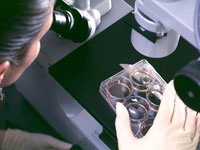Scientists acquire control over diabetes using human embryonic stem cells
The pioneering studies of the effect that human embryonic stem cells have upon diabetes in mice have brought first results. The scientists reported that thanks to the transformed stem cells they managed to control the disease.

The scientists claimed that they turned the stem cells into insulin-producing cells that are essential to keep blood sugar in check.
But the study showed the reverse of the medal. A number of mice developed tumors, the thing that highlighted the danger of testing this method of treatment on people.
Other scientists, instead of implanting the insulin-producing cells into mice, implanted precursor cells that were one step short of developing into insulin-producing cells. As a result mice’s bodies turned the implanted cells into functioning insulin-producing cells in about 90 days.
The scientists tested implants in multiple ways. They used a toxin to destroy the mice’s own islet cells. Those animals with implants continued to produce insulin and control their blood sugar while mice without implants quickly became diabetic. After about 100 days, the scientists removed the implanted cells from the mice, and blood sugar levels shot up.
In spite of the knowledge that human embryonic stem cells can be transformed in any type of cells, can renew themselves and act as a repair system for the body, replenishing specialized cells, practice shows that this field needs more research and warns about dangers in store. But still no one casts away the prospect that the embryonic cells might one day be used to provide insulin-producing replacement cells to treat the disease in people.
Subscribe to Pravda.Ru Telegram channel, Facebook, RSS!




